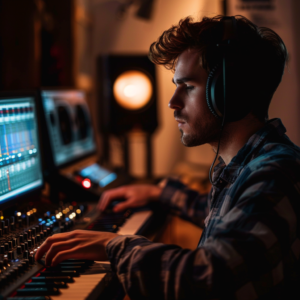Essential Guide to Music Licensing
[ad_1]
If your business plays music in any form, understanding music licensing is essential. Music licensing is the legal process of obtaining permission to use copyrighted music. Although it is often overlooked, music licensing is crucial for businesses to avoid legal issues and create a better customer experience. In this article, we will explore what music licensing is, how it works, and why it’s important for your business. Essential Guide to Music Licensing for Businesses.
What is Music Licensing?

Music licensing allows businesses to legally use copyrighted music for commercial purposes. To do so, a business must obtain a license from the copyright owner, usually the composer, songwriter, or publisher. The two primary types of music licenses are:
- Synchronization Licenses – Used for incorporating music in visual content, like films, TV shows, and commercials.
- Public Performance Licenses – Used for playing music in public spaces, such as restaurants, bars, or retail stores.
These licenses allow businesses to enhance their ambiance while respecting copyright laws.
How Does Music Licensing Work?

Music licensing is governed by copyright laws, which protect the rights of creators. If a business wants to use copyrighted music, it must compensate the copyright owner. The licensing process usually involves:
- Contacting the copyright owner or their representative.
- Negotiating the terms of the license, which outline how the music will be used.
- Paying a licensing fee. This fee can be a one-time payment or a recurring fee, depending on the terms.
By following this process, businesses ensure they are legally compliant and avoid potential penalties for unauthorized music use.
Why is Music Licensing Important for Your Business?
Music licensing is essential for your business because it:
- Protects Against Legal Issues: Without proper licensing, your business could face copyright infringement lawsuits, resulting in costly legal fees and damages.
- Enhances Customer Experience: Playing licensed music can improve your customer’s experience, encouraging them to stay longer, which may lead to higher sales and loyalty.
- Builds Brand Identity: Licensed music allows businesses to curate a unique ambiance that reflects their brand, helping them stand out from competitors. Essential Guide to Music Licensing for Businesses
Ignoring music licensing can be a costly mistake, so it’s important to invest in proper licensing to protect your business.
The Benefits of Music Licensing
Music licensing provides multiple benefits:
- Compliance with Copyright Laws: Licensed music ensures your business is following copyright laws, safeguarding you from legal risks.
- Improved Customer Atmosphere: The right music can elevate the ambiance of your business, making it more enjoyable for customers and encouraging them to return.
- Stronger Brand Identity: Music that matches your brand can create a memorable experience for customers, setting your business apart from competitors.
Music Licensing for Small Businesses
The music licensing process may seem overwhelming for small businesses, but there are resources to simplify it. Many licensing companies offer affordable options, and several online resources provide step-by-step guidance. The cost of a music license typically depends on factors like:
- Business Size: Larger businesses may pay higher fees than smaller businesses.
- Type of Music: Popular music can be more expensive to license than lesser-known songs.
- Intended Use: The way music is used—such as background music or featured music in a video—can affect the licensing cost.
By using available resources, small businesses can find affordable music licensing solutions to stay compliant and enhance their brand.
Conclusion
Music licensing is a fundamental aspect of running a business that plays music. It ensures compliance with copyright laws, protects your business from legal issues, and enhances the customer experience. For small businesses, there are many options available to simplify the licensing process. By obtaining proper music licensing, you can protect your business, create a unique brand identity, and foster customer loyalty.
[ad_2]
